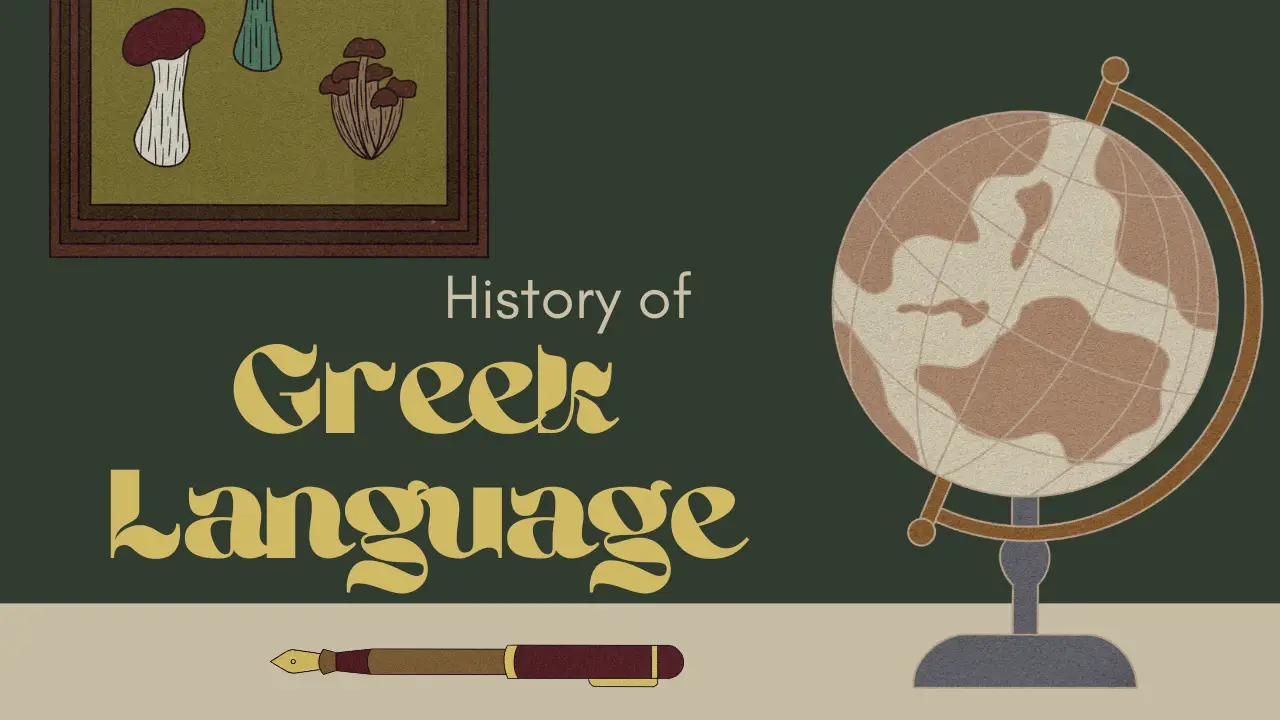According to the Oxford Companion to the English Language, Latin and French significantly impacted English’s vocabulary and conceptual development. One estimate claims that more than 150,000 words in English have Ancient Greek Language roots. It is a broad topic, and one needs to have an in-depth understanding of it.

Brief History of Greek Language
The two main dialects of Greek, one of the first Indo-European languages, are Modern Greek and Ancient Greek (commonly considered dead language).
Modern Greek descends from Koine, a popular Ancient Greek dialect of the time understood throughout the Greek-speaking world. In the 19th century, Modern Greek became the official language of the Kingdom of Greece.
According to Peter T. Daniels, the Ancient Greeks were the first culture to use a “true” alphabet, meaning one with both vowels and consonants. The words “alphabet” and “beta” are the first two letters of the Greek alphabet.
The English lexicon was substantially extended due to the rebirth of Greek learning in Western Europe at the start of the 16th century. However, there were some Greek loans made throughout the time before the Renaissance. Furthermore, in the works of accomplished authors and thinkers like Socrates, Plato, Aristotle, Homer, Aeschylus, Euripides, and Sophocles, this language’s capacity for conveying precise distinction has been developed to its utmost.
Alphabets

The alphabet is where Greek has had the most noticeable influence on English. The English letter “a” and the Greek letter “omega” are two examples of the many Greek letters that have been incorporated into English letters.” Furthermore, a significant portion of the Latin alphabet is a transcription of Greek, whereas the majority of the English alphabet derives from ancient Latin.
For instance, the Latinized form of the Greek letter “chi” was used to create the English “ch” combination.” Some get amazed with the use of many common terms having Greek origins. Many English words, including charisma and chemistry, are created from this combination of letters.
Names of Sciences
Most Greek contributions to the English language’s vocabulary are technical and scientific terminology.
- Many technical terminologies, such as “telegram,” “lithography,” “telephone,” “phonograph,” “ophthalmoscope, “photography,” “microscope,” “telescope,” etc., were created by combining two Greek words.
- Nearly all sciences, including botany, chemistry, biology, anthropology, zoology, physics, mathematics, astrology, and astronomy, have Greek roots in their names.
- Greek is the source of several words in the medical field, including “psychology” (mind), “hepatic” (liver), “neurology” (nerve), “nephrology” (kidney), “cardiology” (heart), “phlebotomy” (vein), “diagnostic,” “tuberculosis,” “symbiosis,” “clinic,” and “larynx,” among others.
Prefixes and Suffixes

Through prefixes and suffixes, Ancient Greek is also present in English in an exciting way. Here, Ancient Greek combines existing terms to produce new ones. Ancient Greek can be understood as providing an active change of the English language by changing the status of a word from verb to noun or verb to adjective.
Suffixes like “-ism,” “-ize,” and “-ist,” for instance, have Greek roots but can be appended to words of many origins. The prefixes and suffixes have great use in many literary pieces, and one cannot deny that the origin of excellent knowledge and theories is Greek and Latin.
Directly Borrowed Words
A sizable component of the English vocabulary is either directly borrowed from Greek, indirectly derived from Greek through other languages like Latin, French, or German, or is composed of several Greek terms’ constituent parts. Greek lexicon strongly influences English, especially in academic and technical writing.
Examples that are frequently used are technique, diagnosis, analysis, synthesis, and antithesis. Additionally, the Greek term “logos” is frequently combined with another Greek word to create the titles of academic subjects. The word “logos,” which is usually rendered as “speech” or “thinking,” here refers to the process of studying something. For instance, the term “geology” refers to the study of the Earth and combines “geo,” the Greek word for Earth, with “logos.”
Grammar

German grammar, which has been greatly affected by Greek, is extensively imitated in English. Greek even invented the word “grammar.” Greek has a similar foundation to English in terms of basic grammatical ideas like nouns, subjects, predicates, adjectives, prepositions, and pronouns. Although English grammar is not exactly the same as Greek grammar, nearly all of its fundamental grammatical categories have Greek roots.
Famous Terms
Some of the most well-known modern English concepts—often thought of as distinctly modern—were developed in ancient Greece. For instance, the term “democracy” and the political system it prefers have their roots in classical Greece.
Furthermore, all of the word’s numerous conjugations have Greek roots; some examples are “autocracy,” “autonomy,” “autobiography,” and “autograph.” The Western world’s language and cultural legacy owe much to their Greek forebears.
Indirectly Borrowed Words

Latin, which for centuries was the primary language of cultural interaction in Europe, was significantly impacted by Greek. Nearly half of all English words are of Latin origin, and a sizable fraction of those words have Greek roots. In addition to borrowing heavily from French and German, Latin also allowed for significant Greek influence.
According to “Lingua Franca,” the biannual bulletin of the foreign language department at Salem State University, the words “village,” “magnify,” “bonus,” and “fame” were all borrowed by Latin from Greek and later adopted by English from Latin.
Idiomatic Phrases
“Crocodile tears” is an expression with Greek antiquity as its source. The idiom might have originated from the widely held ancient myth that crocodiles weep while devouring their prey. In reality, when crocodiles have been out of the water for a while, and their eyes begin to dry out, they actually lubricate their eyes using their tear ducts. However, it is also believed that the behavior happens when crocodiles are feeding. In English, it’s a term for fake demonstrations of sorrow.
Philosophical Terms
Greek was the European language that established the expression of philosophical concepts; hence, it is feasible that terminology connected to philosophy and other disciplines have their roots in Classical Greek. For instance, the words “peripatetic” and “phenomenon” are both derived from the Greek words “peripetatikos” and “phainomenon,” respectively.
- Before the end of the Middle Ages, Greek words including Academy, atom, Bible, harmony, nymph, tragedy, tyrant, and theatre were incorporated into English.
- Greek borrowings from the 16th century include alphabet, drama, elegy, dilemma, caustic, chorus, pathos, epic, theory, and more.
- The modifications from the 17th century include symphony, pandemonium, museums, hyphens, dogmas, and clinics, while those from the 18th century include bathos and philanders. Phasing out or adapting terms like phase, pylon, Acrobat, therm, and agnostic occurred in the 19th century.
Art and Literature
Greek mythology has had a significant impact on Western civilization, particularly on its literature and art. Unsurprisingly, certain idioms that are used frequently in English come from these dating stories and legends. The phrase “Achilles heel” refers to a weakness or weak spot. Greek hero Achilles served as Homer’s protagonist of The Iliad, an epic poem. Only his heel was a threat to him. Though I’m making an effort to eat healthier, chocolate is my nemesis.
Another phrase that is frequently used that comes from Greek mythology is the “Midas touch.” The statement, which describes a nearly supernatural capacity to succeed in anything one attempts, is derived from the legend of King Midas, who is renowned for his capacity to convert everything he touched into gold.
Changed Pronunciation
Many Greek words were imported into Middle English through the medium of Latin, and some also extended through the media of French. The pronunciation of these words is Latinate. Latin changed the Greek letters “u” and “k” to “y” and “c,” respectively. The pronunciation of many Greek nouns was impacted by the ‘closing sound of ‘k’ before vowels like ‘e’ and ‘y’ after the Roman era. As a result, several Greek nouns were pronounced differently.
The word “cycle” is therefore very dissimilar to the Greek word “kuklos,” from which it was derived. (Modern English Cycle; French Cycle; Latin Cycum; Kuklos). Similar to this, many Greek terms that have been translated into English have undergone significant changes and now appear very different from their Greek origins.
Emergence of Mythology
The influence of Greek mythology on literature was highly evident throughout northern Europe. Greek and Latin classical writings were also translated, making mythological tales accessible. Nearly all of the leading English poets, from Shakespeare to Robert Bridges, looked to Greek mythology for inspiration, including Chaucer, the Elizabethans, and John Milton.
Jean Racine revived Greek drama in France and Goethe in Germany. Racine gave new meaning to several old tales, such as Phaidra, Andromache, Oedipus, and Iphigeneia. The world that is the focus of the Harry Potter books is primarily a mythical one. While it isn’t an ancient myth in and of itself, it exhibits many characteristics of myths and uses animals from the mythological world.
Concept of Fate
The Greek deities known as the fates are the source of the word “Fate” in English. Clotho spun life’s thread; Lachesis grabbed it and bestowed fate and luck, and Atropos had the power to sever it at any time. Zeus himself feared the mighty goddesses known as the Fates. For a successful future, the ancient Greeks used to pray to these goddesses, especially at weddings.
The Hours represent time in its heavenly form, another example of Greek monsters. There was also Justice, who offered fairness and justice to everybody. Death was the one who claimed lives for himself. Two goddesses adorned the nighttime world: Sleep and Dreams.
Poetry and Pillared Temple
In terms of astronomy, chronology, and mathematics, the Hellenes gained enormously from other nations’ knowledge and accomplishments. Still, their greatest accomplishment—becoming the forerunners of European philosophy and science—came from using their own inborn skills. Their accomplishments in representative art and architecture were equally important.
The representation of the human form in sculpture in the round fulfilled their desire for a perfect, naturalistic rendering. The pillared temple’s development to a higher degree of harmony was another noteworthy accomplishment. The genius of the Hellenes produced both form and content in poetry, which has continued to inspire European literature. Thus, there’s a long list of many such contributions.
Political Influence
Greeks had a strong sense of politics, which led to a range of governmental structures from which their theory of political science extracted several kinds of constitutions that are still in use today. There were frequent times when people took control of the city and reigned brutally. Overall, Greece’s political history may be broken down into three distinct phases: monarchical control, which dates back to the Mycenaean civilization; a feudal period marked by an oligarchy of aristocratic landowners; and, ultimately, various degrees of democracy.
The free democratic citizens were created as a result of the inclination for ever-larger segments of the population to participate in state affairs. Still, the institution of slavery, which underpinned Greek society and the Greek economy, was unaffected.
Civilization and Commerce
The civilization that the Greeks had started was carried to the conquered regions of Europe by Rome, who also made significant additions in the shape of governmental structure, military institutions, and the rule of law. Different types of culture started to be assimilated into the Hellenistic-Roman framework within the confines of the empire and under the protection of its chain of fortresses, which continuously extended the length of its frontiers (marked in Europe by the Rhine and the Danube).
The soldiers primarily supported romanization, but it was also influenced by the Roman government, social structure, and economic factors. Latin spread throughout the world as the language of business and finally became nearly universal, except in the eastern Mediterranean, where Greek remained the language of choice.
Final Thoughts on Ancient Greek Language Impact on The English Language
There has been a significant influence on the English language from the ancient Greek and Latin terms and so many concepts like mythology, politics, and civilizations. Thus, Greek culture has significantly contributed to the emergence of many concepts in modern English culture.



